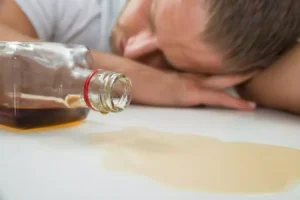
By doing so, it can help reduce stress and anxiety, which are common triggers for alcohol cravings. One study found that individuals who practiced mindfulness meditation were less likely to relapse after completing an alcohol treatment program. While herbal remedies can be helpful for reducing alcohol cravings, it’s important to remember that they’re not a substitute for professional medical advice or treatment. If you’re struggling with addiction, it’s important to seek professional help and develop a comprehensive treatment plan that addresses all aspects of your health and wellbeing. If you’re in an alcohol addiction treatment program, you know how tough it can be to overcome alcohol cravings.
Nuts and Seeds: Healthy Fats to the Rescue

These cravings can be frustrating if you’re trying to cut down on alcohol, drink less or stop drinking completely, but they are quite normal. Turns out, these drugs (as well as the GLP-1 hormone) don’t just work on blood sugar. «They also work in your brain,» says Dr. Lorenzo Leggio, who’s the clinical director of the National Institute of Drug Abuse. Healthcare professionals can work with a person to outline a treatment strategy that can help reduce the amount of alcohol they consume and reduce the risk of long lasting adverse effects. Research has also found that combining CBD and naltrexone, a medication that treats substance misuse, can reduce the urge to drink alcohol. I consider this compound to be the crowning jewel for cravings, as it’s not only been extensively studied with alcohol cravings, but also cocaine, methamphetamine, and cannabis too.

Welcome to Mainspring Recovery, The #1 Rehab Center in Virginia
However, once a person begins to consume alcoholic beverages regularly, the brain chemistry starts to change. The first difference a person may notice is that they need more alcohol to achieve the effects they enjoy. Increasing the amount and frequency of drinking starts changing brain function. It becomes more and more difficult for the brain to function as it did before it was altered by excessive consumption.

Social Media’s Power Over Self-Esteem and Mental Health
Some evidence suggests that taking magnesium supplements in recovery can help with liver function and depression, and it may lessen cancer risk. Chronic alcohol use causes the body to excrete too much magnesium and other electrolytes through urination, often resulting in a magnesium deficiency. Chronically low levels of magnesium can cause nausea, heart palpitations, stiffness, muscle spasms, general body weakness, and increase the risks of high blood pressure and type-2 diabetes.
- Breaking the addiction to alcohol can be difficult and cravings hard to overcome.
- Other studies in animals have also found that GLP-1 drugs reduce the consumption of nicotine, opioids, as well as psychostimulants, such as cocaine and methamphetamine.
- For this reason, people who drink heavily may benefit from magnesium supplements.
Because alcohol impairs the absorption and metabolization of vitamins, it can also cause deficiencies in important vitamins like A, B, C, D, E, and K. These deficiencies can impact your vision, https://ecosoberhouse.com/article/benzodiazepine-withdrawal-symptoms-timeline-and-treatment/ bones, blood, and even lead to severe neurological damage. And although alcohol itself does not limit the absorption of minerals, alcohol-related problems can result in deficiencies of calcium, magnesium, iron, and zinc. Ria Health offers several FDA-approved medications for alcohol use disorder. When combined with counseling, this approach is proven highly effective. Because alcohol is an immunosuppressant, some people take vitamin C to combat some health risks of alcohol use.
- Repeat this exercise several times until you feel more relaxed and centered.
- From exciting salads and protein-packed main dishes to healthy snacks, there’s no limit to the ways you can incorporate these foods into your diet.
- These treatment options should be pursued under the guidance of a qualified healthcare professional or addiction specialist.
- In fact, this is one of the main vitamins given to people going through medical detox from alcohol.
- The research suggests that vitamin C supplementation, in addition to thiamine, should be considered for these individuals.
Withdrawal is a syndrome of intense physical discomfort and emotional distress that occurs when the use of alcohol and other substances is abruptly stopped following prolonged heavy use. Individuals who chronically abuse alcohol or other substances are at increased risk for depressed mood, anxiety, memory problems, dementia and insomnia. Overall, keeping a journal can be an effective way to increase self-awareness and identify patterns in your behavior that may be contributing to alcohol cravings. By using this information to develop strategies for managing triggers and avoiding relapse, you can increase your chances of success in quitting drinking naturally. Cannabidiol, or CBD, is a compound that naturally occurs in the cannabis plant. More research is needed, but early studies suggest that CBD may help with pain management, anxiety, alcohol cravings, and even liver and brain damage linked to excessive drinking.
Does The Urge To Drink Ever Go Away?

Along with good nutrition and eating a well-balanced diet, getting adequate sleep and being active physically are helpful for reducing cravings. There are also plenty of ways to use herbal remedies for alcohol cravings. While diet alone cannot cure alcohol cravings, it can certainly play a key role in the alcohol addiction recovery process. Incorporating beneficial foods into your diet can support brain and body health, and potentially lessen the intensity of alcohol cravings.
Medication to Help with Alcohol Cravings
Alcohol cravings are often a significant obstacle for those seeking to reduce their alcohol consumption or achieve sobriety. These cravings can occur at any time and can be triggered by various factors, such as stress, social situations, or even certain foods. If you’re struggling to quit drinking on your own, seeking professional help from a therapist or addiction specialist can provide valuable support and guidance. These professionals can help you develop personalized strategies for managing triggers and avoiding relapse, as well as provide emotional support during the ups and downs of recovery. Getting enough sleep is essential for overall health and can also help reduce stress levels. When you’re trying to quit drinking naturally, it’s important to prioritize getting enough restful sleep each night.
- Your body may crave alcohol long after your last drink, and this can pose a severe challenge to your recovery.
- In 2019, 5.3% of people aged 12 years or older in the United States had AUD, previously known as alcoholism.
- At Compassion Behavioral Health, we understand that addiction is multifaceted.
- Within 5 minutes, you’ll receive an email with these details – free of charge.
- Because alcohol impairs the absorption and metabolization of vitamins, it can also cause deficiencies in important vitamins like A, B, C, D, E, and K.
Vitamin B1 deficiency can cause weight loss, irritability, fatigue, and in extreme cases lead to Wernicke-Korsakoff syndrome, also known as wet brain. There’s no way around it—when you drink heavily for a long period, your body takes a hit. Overcoming alcohol use disorder can be a long and difficult process, and different people have different needs. But one often-overlooked aspect of beating addiction is nutrition in recovery. The protein in poultry and fish helps in the production of dopamine, which can help herbs to curb alcohol cravings improve your mood as you fight alcohol cravings.
Combining medication with therapy and other interventions can prove even more helpful than medication alone. External triggers refer to the environmental cues you link to alcohol, including places, times, people, and situations. The new edition of the Diagnostic and Statistical Manual of Mental Disorders (DSM-5) includes cravings as part of the diagnostic criteria for alcohol use disorder (AUD). Alcohol can also take a toll on your relationships with friends and family members. By quitting drinking, you’ll be better able to connect with others and build stronger, healthier relationships.
